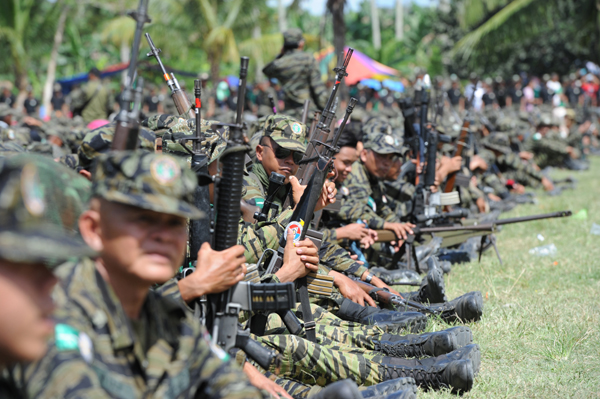Moro Islamic Liberation Front rebels gather inside their camp as thousands of its members and residents arrive for a rally in support of the peace agreement with the government at Camp Darapanan in Sultan Kudarat on the southern island of Mindanao on Thursday. A new peace deal between the government and rebels will create an autonomous region for Muslims. Ted Aljibe / Agence France-Presse

Agreement to set aside 10 percent of country for autonomous region
The Philippines government signed a peace deal with the nation's biggest Muslim rebel group on Thursday aimed at ending four decades of deadly conflict that has condemned millions in the nation's far south to brutal poverty.
The agreement between the Moro Islamic Liberation Front and President Benigno Aquino III's government envisages a new, southern autonomous region for the Philippines' Muslim minority with locally elected leaders by mid-2016.
Aquino and Malaysian Prime Minister Najib Razak, who put aside his own country's problems over a missing Malaysia Airlines jet to witness the event, clapped as peace panel leaders signed the deal at Manila's presidential palace.
"Let us exchange our bullets for ripening fruit, our cynicism for hope, our histories of sorrow for a future of harmony, peace, and prosperity," Aquino told a gathering of officials, diplomats, lawmakers and community members.
"I will not let peace be snatched from my people again."
Muslim rebel leader Al Haj Ebrahim Murad said, "The comprehensive agreement on the Bangsamoro is the crowning glory of our struggle," in a reference to the new region, which takes for itself the name used for Muslim and non-Christian natives of southern Mindanao island.
He invited other Islamic groups, such as the Moro National Liberation Front, which opposed the deal, to join the new Bangsamoro political entity.
Muslim rebels have been battling since the 1970s for independence or autonomy in the southern region of Mindanao, which they regard as their ancestral homeland.
The conflict has left tens of thousands of people dead, and Mindanao has become one of the nation's poorest and most corrupt areas, with Muslim and Christian warlords ruling over large areas.
The fighting and poverty have provided fertile conditions for Islamic extremism, with the al-Qaida-linked Abu Sayyaf group and other hard-line militants making remote regions of Mindanao their strongholds.
The Moro Islamic Liberation Front, which the military estimates has 10,000 fighters, is easily the biggest Muslim rebel group in Mindanao, and Aquino believes a political settlement is the key to securing a lasting peace.
Malaysia has hosted and brokered the peace talks, which began 17 years ago.
Splitting resources
The peace deal outlines plans to create a Bangsamoro self-rule area in Mindanao that would cover about 10 percent of the Philippines, the population of which is mostly Roman Catholic.
There are about 10 million Muslims in the Philippines, roughly 10 percent of the population, according to government statistics. Most live in the south of the country.
The autonomous region would have its own police force, a regional parliament and power to levy taxes, while revenues from the region's vast deposits of natural resources would be split with the national government.
It would have a secular government, rather than being an Islamic state, with the national government retaining control of defense, foreign policy, currency and citizenship.
However, there are no guarantees the peace deal will be implemented before a crucial deadline in the middle of 2016, when Aquino is required by the constitution to end his six-year term.
Aquino needs to persuade Congress to pass a "basic law" to create the Bangsamoro autonomous region, ideally by the end of this year, to allow time for other steps, such as a local plebiscite.
The rebel group will not give up its arms or the identities of its fighters until the basic law has been passed, highlighting the fragility of the peace.
Even though Aquino's ruling coalition has a loose majority and he still enjoys record-high popularity ratings, there are concerns politicians could reject or water down the proposed law.
Powerful Christian politicians in Mindanao are regarded as potential deal breakers, while others elsewhere may see political advantage in opposing the deal to appeal to some Catholics ahead of the 2016 national elections.
Islamic militants opposed to the peace deal are another threat and could continue to create enduring violence in Mindanao. Troops have been placed on high alert in the south, in case militants seek to distract from the peace deal.
Reuters - AFP
